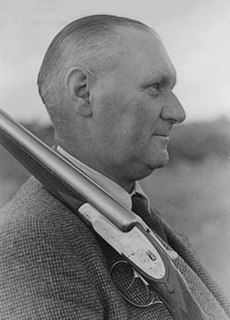
The 1912 Summer Olympics, officially known as the Games of the V Olympiad, were an international multi-sport event held in Stockholm, Sweden, between 5 May and 22 July 1912.

France was the host of the 1900 Summer Olympics in Paris. France was one of many nations that had competed in the 1896 Summer Olympics in Greece and had returned to compete at the 1900 Games.
Léon Moreaux was a French sports shooter and Olympian who competed in pistol and rifle shooting in the late 19th century and early 20th century.

The men's individual competition with revolver and pistol, distance 50 metres was a shooting sports event held as part of the shooting at the 1912 Summer Olympics programme. It was the fourth appearance of the event, which was the only one to have been featured at every edition of the Games to that point. The competition was held on Monday, 1 July 1912. Fifty-four sport shooters from twelve nations competed. Nations were limited to 12 shooters each. The event was won by Alfred Lane of the United States, completing a double for him with the rapid fire pistol event. It was the United States' second victory in the event. Another American, Peter Dolfen, finished second. Charles Stewart of Great Britain took the bronze medal, the nation's first in the free pistol.
John A. Dietz was an American sports shooter who competed at the 1908 Summer Olympics and the 1912 Summer Olympics. He won two gold medals as part of the American pistol team.
Guilherme Paraense was a Brazilian sport shooter and Olympic Champion. He was the first Brazilian to win an Olympic gold medal.

Johan Hübner von Holst was a Swedish sport shooter who competed at the 1906, 1908 and 1912 Summer Olympics.

Mauritz Eriksson was a Swedish sport shooter who competed in the 1912 Summer Olympics, in the 1920 Summer Olympics, and in the 1924 Summer Olympics.

Raoul Marie Joseph Count de Boigne was a French sport shooter who competed at the 1906 Intercalated Games, the 1908 Summer Olympics and 1912 Summer Olympics. He was born in Geneva, Switzerland and died in Ouveillan, France.
Sebastião Wolf was a Brazilian sport shooter who competed in the 1920 Summer Olympics. In 1920 he won the bronze medal with the Brazilian team in the team 50 metre free pistol competition.

Léon Johnson was a French sport shooter who competed at the 1908 Summer Olympics, the 1912 Summer Olympics and at the 1920 Summer Olympics.
Laurits Theodor Christian Larsen was a Danish sport shooter who competed in the 1912 Summer Olympics and in the 1920 Summer Olympics.

Niels Hansen Ditlev Larsen was a Danish sport shooter and rifle manufacturer. He competed in various rifle and pistol events in the 1912, 1920 and 1924 Summer Olympics and won one gold, one silver and three bronze medals, becoming the most successful Danish Olympic shooter.
Hugh Durant was a British sport shooter and modern pentathlete who competed in the 1912 Summer Olympics.
Albert Joseph Kempster was a British sport shooter who competed at the 1908 Summer Olympics and the 1912 Summer Olympics.
Horatio Orlando Poulter was a British sport shooter who competed in the 1912 Summer Olympics.
André Regaud was a French shooter who competed at the 1908 Summer Olympics, the 1912 Summer Olympics and the 1920 Summer Olympics.
Fritz Zulauf was a Swiss sport shooter who competed in the 1920 Summer Olympics.
Afrânio Antônio da Costa was a Brazilian sport shooter who competed in the 1920 Summer Olympics. He was born and died in Rio de Janeiro.
The Modern Pentathlon Association Great Britain is the national governing body for the sport of modern pentathlon in Great Britain, recognised by the Union Internationale de Pentathlon Moderne. Modern Pentathlon, the sport Baron Pierre de Coubertin called ‘the veritable consecration of the complete athlete’ comprises five events: fencing, swimming, riding, shooting and running. Today's competition involves fencing épée for a single hit against each of the other competitors; swimming 200 metres freestyle; riding an unknown horse round a show-jumping course, and then running four 800 metre laps each preceded by shooting at five targets with a laser pistol. First appearing in the Olympic Games of 1912 at the specific request of de Coubertin, founder of the Modern Olympic Games, the same five sports have comprised this greatest of all Olympic challenges and the sport completed one hundred years of unbroken Olympic participation in 2012. Despite technological changes the five events have remained essentially the same. In Stockholm in 1912, competitors brought their own horses, fenced outdoors without electric equipment, used military pistols and swam and ran outdoors. The Stockholm event took six days to complete while the super-athletes of today finish in a single day; in 1912 only men competed while today women share equal billing; the 1912 competitors were nearly all military men while today civilians generally dominate the sport. The recent changes in the sport which combine shooting and running in a single event and make use of laser pistols are some of the exciting new developments that put Modern Pentathlon at the forefront of 21st century sporting advances. Even after one hundred years of Olympic competition, Modern Pentathlon's ability to move with the times has made it the true test of the all-round Olympic super athlete.







